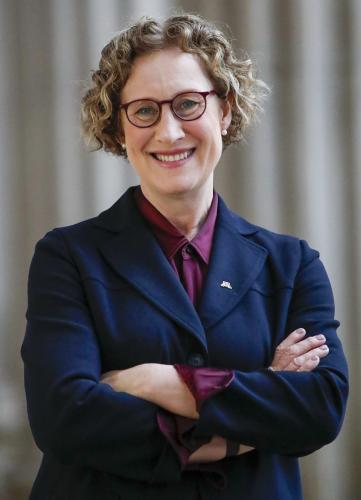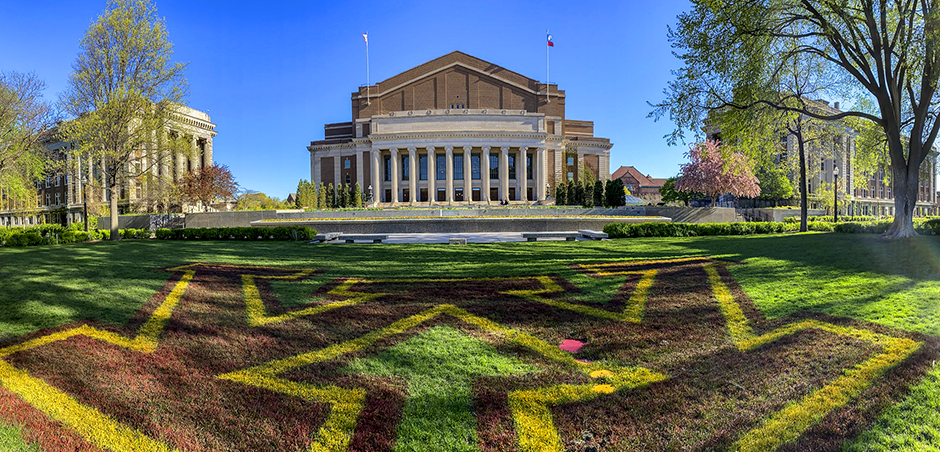



WASHINGTON – The University of Minnesota, swept up like other schools in the maelstrom of Trump administration policies they say erode academic freedom, is undergoing intense internal debate about what to do about it.
The questions that have pitted students and faculty members against the university’s administration are whether and how the state’s largest institution of higher learning should fight back.
Higher education quickly became one of President Trump’s prime targets after he was sworn in to his second term. His administration cut off funding for schools that did not comply with its demands and launched investigations into dozens of schools, including the University of Minnesota, which is the target of probes into alleged antisemitism and race-based admission policies.
Deciding there was strength in numbers, hundreds of college presidents and officials have signed an American Association of Colleges and Universities (AACU) letter that decried the “unprecedented government overreach and political interference.”
Related: Trump 2.0: How the president’s first 100 days have impacted Minnesota
The leaders of about a dozen Minnesota schools, including the presidents of Gustavus Adolphus College, Carleton College, the University of St. Thomas, Minneapolis College of Arts and Design and Mitchell Hamline School of Law signed on to the letter, which as of Tuesday had more than 550 signatures.
Yet the University of Minnesota’s new president, Rebecca Cunningham, took a pass.
The university has not responded to several requests for information about the school’s decision to reject the AACU’s effort and on other initiatives in which the nation’s schools are trying to organize a defense to the Trump administration’s actions.
For instance, during a Zoom call Thursday, the university senate voted overwhelmingly for a resolution to join a Big Ten effort, led by Rutgers University, that would establish a joint defense pact against Trump.
!function(){“use strict”;window.addEventListener(“message”,(function(a){if(void 0!==a.data[“datawrapper-height”]){var e=document.querySelectorAll(“iframe”);for(var t in a.data[“datawrapper-height”])for(var r,i=0;r=e[i];i++)if(r.contentWindow===a.source){var d=a.data[“datawrapper-height”][t]+”px”;r.style.height=d}}}))}();Those who’ve spoken with Cunningham about the issue say she’s taken a “neutral” and “non-committal” stance on the Big Ten resolution and is, in general, trying to avoid conflict and involvement of the school in politics.
On a recording of the Zoom call, Cunningham spoke of her general wariness toward making statements. “You will not tend to see me making statements, first of all, just to join on because other people are making them,” she said.
‘A lot of backchannel communication’
The school’s Board of Regents has also taken a “keep your head down” approach.
At its last meeting in March, the regents approved a resolution that said all official communications from the university must be approved by the president. The resolution also says the university will not comment on issues that address matters of public concern unless it affects the concerns of the university.
Faculty and student members of the university senate who voted overwhelmingly for the Big Ten resolution last week said there must be more of an effort to combat Trump administration policies.
Related: Lawmakers vexed and divided on funding Minnesota schools
The initiative would allow the Big 10 schools to pool resources for a NATO-like compact that would defend administration attacks on a school by funding lawsuits and information campaigns about the dangers posed by the administration on free speech, academic excellence and scientific and medical research.
University senates at more than half a dozen schools — including the University of Nebraska, University of Michigan and University of Maryland — have approved similar resolutions asking their administrators to join the effort.
“Something has to be done,” said Rachna Shah, a professor of supply chains and operations at the university’s Carlson School of Management. “What is happening with the Trump administration imposes extreme costs to the university.”

Shah is concerned that the threat of losing federal funding is serious. More than $3.8 billion, or about 17.5% of the school’s revenue, came from the federal government in 2023.
Shah said it is likely that “a lot of back-channel conversations are going on” with associations that represent higher education. But she said that if the Trump administration continues to target the nation’s universities and colleges — and she thinks that will happen — “more forceful and clearer statements may be needed.”
Chase Krug, a 24-year old graduate student who is also a member of the university senate, said there are “behind-the-scene” efforts to lobby Cunningham to support the Big 10 initiative.
“Why are we not leading in this space?” he asked. “Why are we having to push so hard when the administration should be protecting us?”
Yet Krug has doubts Cunningham will allow the school to join the effort.
“I think she believes it would put an extra target on the university,” he said.
!function(){“use strict”;window.addEventListener(“message”,(function(a){if(void 0!==a.data[“datawrapper-height”]){var e=document.querySelectorAll(“iframe”);for(var t in a.data[“datawrapper-height”])for(var r,i=0;r=e[i];i++)if(r.contentWindow===a.source){var d=a.data[“datawrapper-height”][t]+”px”;r.style.height=d}}}))}();Senate member V.V. Ganeshananthan, an English professor who introduced the resolution, said it’s an opportunity for the new university administration to engage with its faculty and students in a meaningful way.
Ganeshananthan also said it’s worth debating whether the demands made by the Trump administration, which include eliminating diversity, equity and inclusion (DEI) policies and programs from campus, should be satisfied to safeguard federal funding.
That’s because schools that band together are largely acknowledging they are not safe under Trump, regardless of whether institutions comply with administration demands, Ganeshananthan said.
The resolution asks Cunningham to assume a leadership role in the Big Ten effort.
“Be it finally resolved that, this resolution be transmitted to the leadership of all Big Ten universities and their respective governing boards and shared governance bodies, and that the President of the University of Minnesota take a leading role in convening a summit of Big Ten academic and legal leadership to initiate the implementation of this Compact,” the resolution said.
Related: Ellison sues Trump over end to public school diversity programs
Law professor Matthew Bodie, one of the co-sponsors of the resolution, said he understood Cunningham’s hesitancy in getting involved in a very public pushback on the Trump administration.

He said since Cunningham is a former doctor and former vice president for research at the University of Michigan, she is particularly sensitive to the threats of a cutoff of Department of Health and Human Service grants, which are now the subject to several lawsuits.
“I understand her not getting into a fight if it can be avoided,” Bodie said. “But I certainly hope that after she considers the resolution, she’ll support it.”
Harvard creates momentum
AACU President Lynn Pasquerella said the idea for a statement against the political pressure Trump has placed on the nation’s colleges was born during a conversation she had with Laurie Patton, president of the American Association of Arts and Science, during a convention in Florida.
“We wondered why more people weren’t speaking out,” Pasquerella said.
She said she held two “listening sessions” with dozens of university presidents in April and drafted a statement to defend academic freedom.
“Some people wanted it to be bolder, others wanted it to be more conservative,” she said. Several university presidents said they could not sign on “because of the politics of their states.”
The resolution, which initially had a little over 100 signers, was made public last week, right after Harvard University, which was threatened with a cutoff of $2.2 billion in federal money, decided to sue the Trump administration instead of acceding to its demands.

The demands included auditing Harvard’s professors for plagiarism and appointing an outside overseer to ensure the school’s faculty and departments were “viewpoint diverse.”
Pasquerella said the AACU was not influenced by Harvard’s behavior, but “it certainly helped catalyze the effort and create momentum.”
“When one university is attacked, we all are attacked,” she said.
The post As other schools band together against Trump threats, the University of Minnesota keeps a low profile appeared first on MinnPost.
















































